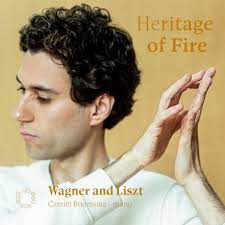An Virtuosität mangelt es nicht in den Interpretationen des niederländischen Pianisten Camiel Boomsa auf diesem Album, aber das ist nicht das Wichtigste. Vielmehr schätze ich vor allem das Nachdenkliche, das Zarte, das an vielen Stellen bewegt, sowie auch der Kontrast zwischen leidenschaftlichem Drama und Verhaltenheit oder Meditation, das die sehr persönliche und ausdrucksstarke Interpretation der h-Moll-Sonate von Liszt auszeichnet. Dieses Verteilen der Kräfte erlaubt Boomsma dann genügend Reserven, um den hymnischen Elan am Schluss packend zu gestalten und dann in eine fast ätherische Ruhe zu tauchen.
Bemerkenswert ist auch seine eigene Bearbeitung von drei Szenen aus Wagners Parsifal, die sich gegenüber Godowskis Transkription von drei Szenen aus Tannhäuser behaupten kann. Boosmas technische Souveränität und stilistische Affinität sind bewundernswert.
Zum Titel der CD schreibt Boomsma: « Wagners Musik ist in gewisser Weise ein Erbe meiner Jugend geworden. Sie ist zu einer feurigen Leidenschaft geworden. Friedelind Wagner, die unabhängige Enkelin Richard Wagners, hat ihre Memoiren mit dem Titel ‘Das Erbe des Feuers’ geschrieben, in denen sie beschreibt, wie es war, als eine von Wagners Enkelinnen aufzuwachsen. In ihrer Geschichte erkenne ich das Gefühl, von der Ausdruckskraft und Ambivalenz Wagners, seines Erbes und seiner Musik überwältigt zu sein. Es ist eine Welt für sich, voller Widersprüche, Liebe, Konflikte, Schönheit und Ideale. »
Die Tonaufnahme ist recht trocken und direkt, der Klavierklang nicht unbedingt der schönste, aber übers ganze Spektrum ausgewogen und vor allem von bestechender Klarheit.
There is no lack of virtuosity in the interpretations of the Dutch pianist Camiel Boomsa on this album, but that is not the most important thing. Rather, I appreciate above all the thoughtfulness, the tenderness that is moving in many places, as well as the contrast between passionate drama and restraint or meditation that characterizes the very personal and expressive interpretation of Liszt’s Sonata in B minor. This distribution of forces then allows Boomsma sufficient reserves to shape the hymnic élan at the end in a gripping manner and then to plunge into an almost ethereal calm.
Also noteworthy is his own arrangement of three scenes from Wagner’s Parsifal, which can hold its own against Godowski’s transcription of three scenes from Tannhäuser. Boomsma’s technical mastery and stylistic affinity are admirable.
Boomsma writes about the title of the CD: « In a way, Wagner’s music has become a legacy of my youth. It has become a fiery passion. Friedelind Wagner, the independent granddaughter of Richard Wagner, has written her memoirs entitled ‘The Legacy of Fire’, in which she describes what it was like to grow up as one of Wagner’s granddaughters. In her story, I recognize the feeling of being overwhelmed by the expressiveness and ambivalence of Wagner, his legacy and his music. It is a world of its own, full of contradictions, love, conflict, beauty and ideals. »
The recorded sound is quite dry and direct, the piano sound not necessarily the most beautiful, but balanced across the whole spectrum and above all of great clarity.




















